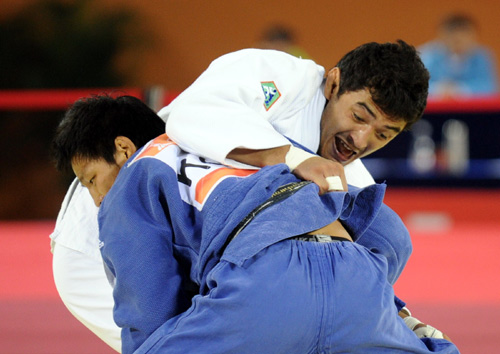 |
|
Uzbekistan judoka Shokir Muminov (top) competes in the men's 81kg judo finals at the 16th Asian Games in Guangzhou, Nov 14, 2010. [Photo/Xinhua]
|
GUANGZHOU - A Uzbekistan judoka has become the first athlete to flunk a doping screening at the Asian Games.
Shokir Mumonov, who won a silver medal in the men's 81kg category, tested positive for Methylhexaneamine, a stimulant which was added to the World Anti-Doping Angecy (WADA) list of banned drugs this year.
"The athlete has been disqualified from the competition as well as these games and his performance in the competition has been nullified, his medal withdrawn and appropriate adjustment made to the results," Dr. Mani Jegathesan, chairman of Olympic Council of Asia medical commission, announced here on Friday afternoon.
"His urine specimen collected on November 14 after the competition was found to contain Methylhexaneamine."
The findings have been referred to the Uzbekistan Olympic Committee, the International Judo Federation and to the WADA.
The 27-year-old Munonov lost to South Korea's Kim Jae-Bum by ippon in the final last Sunday, while Japan's Masahiro Takamatsu and Islam Bozbayev of Kazakhstan shared third place.
At the 2008 Beijing Olympics, Muminov lost in the round of 16 but reached the second round of the repechage before losing to eventual bronze medalist Leandro Guilheiro from Brazil.
Timurnsshk Nbaev, spokesman for Uzbekistan delegation, refused to comment on the first doping case in Guangzhou.
"No comment. I am very busy right now," Nbaev said to Xinhua.
All samples collected at the Guangzhou Games are being tested at the WADA lab in Beijing, which conducted drug checks for the 2008 Summer Olympics.
"Methylhexaneamine is a new stimulant and we had just started to test this drug recently," said Beijing lab chief Xu Youxuan.
Methylhexaneamine has been the subject of several high-profile doping cases since the WADA added the substance to its banned list this year.
The substance is widely used as a nasal decongestant but is also found in recreational drugs. A component of flower oil, the substance is a common ingredient in a variety of nutritional supplements and easily available on the Internet.
Some athletes have said they unwittingly ingested Methylhexaneamine when using supplements or other products.
Nigerian sprinter Osayomi Oludamola was stripped of her Commonwealth Games 100 meters gold medal for using Methylhexaneamine. Six Indian wrestlers and three swimmers also tested positive for the drug ahead of the Games.
Last week South African rugby players Chiliboy Ralepelle and Bjorn Basson had turned in positive samples for Methylhexaneamine following the Springboks' 23-21 win over Ireland in Dublin on November 6.
In last Asian Games in Doha, four weightlifters, including two Uzbekistan athletes, were disqualified for positive doping tests.
Myanamar lifters Kyi Kyi Than and Oo Mya Sanda, a silver medalist in the 75kg division, both tested positive.
Uzbekistan's Elmira Ramileva was caught to have used an anabolic steroid and teammate Alexander Urinov was found to have taken cannabis.

